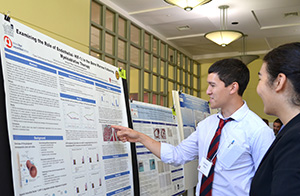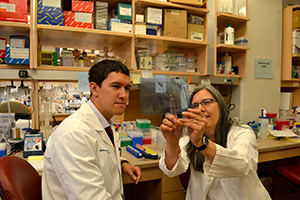
As an intern with the Heart, Lung and Blood Summer Research Program at Case Western Reserve University, medical student Zachary Maas had the chance to present his findings in a poster presentation this summer.
As a child growing up in the foster care system, the Class of 2018’s Zachary Maas never imagined he could one day become a doctor.
But that’s the path he is now taking.
“Growing up, I received medical care at free clinics,” he said. “I certainly didn’t have the pedigree to become a doctor, but this is something I really want. I’m working hard to make it happen.”
Zachary is a rising second-year student at the VCU School of Medicine. He was one of eight medical students from across the country to participate this summer in the Heart, Lung and Blood Summer Research Program at Case Western Reserve University in Cleveland. The eight-week program is designed to engage students in state-of-the art biomedical research in cardiovascular, pulmonary, hematological and sleep disorders research.
Zachary’ research delved into the role of HIF, a transcription factor involved in establishing the oxygen supply of growing or injured tissue. This is critical, Zachary said, to the understanding of chronic vascular disease, bone marrow therapies, and tumor resistance to chemotherapy. He presented his research in the form of a poster to the Case campus on July 31.
“Zach did extremely well,” said Diana Ramirez-Bergeron, Ph.D., Zachary‘s mentor and an assistant professor in the Department of Medicine and the Case Cardiovascular Research Institute. “A lot of students come in to get the experience, a letter of recommendation and then move on. That’s not Zach. He’s incredibly dedicated.”
Zachary spent early mornings and late evenings in the lab, fascinated with the research side of medicine.

“A lot of students come in to get the experience, a letter of recommendation and then move on,” said Diana Ramirez-Bergeron, Ph.D., Zachary’s mentor at Case Western. “That’s not Zach. He’s incredibly dedicated.”
“A lot of people have an interest in helping the underserved, and my interest in research sort of stems from that,” Zachary said. “I see research as a way to fight for better outcomes in groups of patients who could really use our help. I’ve always admired people who look at medicine that way. It takes so much dedication because research can take so long to even make a dent.”
As a pre-teen, Zachary doubted his ability to achieve success in life. He was taken out of his Mountain View, California home at age 8 and placed in foster care. He bounced from foster home to foster home for years. But when was 11, he found solid ground with his second-grade teacher, who opened her home to him.
“My life was going nowhere,” he said. “It had been constant turmoil. But after I moved in with her, my grades improved and things got much, much better.”
The summer after high school graduation, a friend told him about a documentary following physicians’ careers at Johns Hopkins. Zachary watched it and was amazed.
“I thought if I could be like anyone in this life, it would be like those doctors,” he said. “Their dedication and the impact they were making was incredible. I made it my mission to be that good.”
He signed up for the toughest classes he could find at the University of Southern California and graduated with degrees in biology and economics. He also served as co-captain of his school’s dragon boat team.
“Beginning at USC, I felt like I didn’t even deserve to be there,” Zachary said. “But I decided to focus on just getting better. And I think I carry a lot of that same mentality with me, even here in medical school.”
On VCU’s Medical College of Virginia Campus, he calls himself fortunate to be surrounded by physicians who encourage and challenge him every day.
“Every day I’m looking for them,” he said. “I’ve been lucky to find several amazing doctors here to look up to. I love that feeling of finding people who embody what I want to emulate, and I have that here. I’m learning what it means and what it takes to be a great doctor. I have found what I want to be.”
After his experience at Case Western, Zachary is more convinced than ever that he can help patients by devoting his life to research. He is not yet sure how many years of research he’ll be able to fit in his training, but he is anxious to leave his mark wherever he can do the most good.
“When you see someone who suffers from a terrible illness or disease, the human in you is simply moved to do something about it,” Zachary said. “With research, I can combine this intense intellectual interest with the beautiful act of helping a group of people in need. Success stories in research are far from guaranteed, but by just working hard every day and doing our best, I know that my colleagues and I can change people’s lives together.”
By Janet Showalter